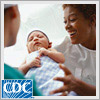Protect Your Baby from Group B Strep
[Announcer] This podcast is presented by the Centers for Disease Control and Prevention. CDC - safer, healthier people.
Your due date is fast approaching. The last weeks of pregnancy tend to be full of anticipation…especially about your baby's well-being.
Hi, I'm Tarayn Fairlie, a pediatrician and a new mom. Today, we're going to talk about a topic to help ensure your baby's health at birth. It's a topic you might not know about… group B streptococcus or group B strep…a type of bacteria that can cause serious problems for your newborn. We'll discuss when to get tested for group B strep, how it may affect your newborn, and what type of medicines are used to prevent illness from group B strep in newborns.
First, let's clear up any confusion there may be about the term 'strep'. Strep – short for streptococcus – are a variety of bacteria that can be harmless, but can also cause infections ranging from mild to very serious. There are many types of strep.
Group A strep causes skin infections and upper respiratory illness, like strep throat. Group B strep is a totally different type of bacteria that’s sometimes found in our digestive, urinary, and reproductive tracts. Most of the time, we don't need to worry about group B strep—but if you're pregnant, it can cause serious problems for your newborn. Pregnant women need to be tested for group B strep and women who test positive need antibiotics when they go into labor.
About 10 to 30 percent of pregnant women are colonized with group B strep – that means it lives in their digestive, urinary, and reproductive tracts without causing any symptoms or health problems. Since there are no symptoms, women who are colonized have no way of knowing they have the bacteria unless they get tested. While group B strep doesn't cause a problem for the women who are colonized, they can pass group B strep on to their baby during labor. This type of bacterial infection in a newborn can be serious.
If you're pregnant, get tested for group B strep near the time of your due date…between 35 and 37 weeks. Since it can come and go in your body, getting tested earlier or during a past pregnancy isn't helpful. You have to get the test towards the end of each pregnancy. If group B strep is present during this pregnancy, you'll be given an antibiotic, like penicillin, during labor to protect your baby. You should also get antibiotics during labor if you have group B strep in your urine during this pregnancy, or have had a baby before who had a serious infection with group B strep. Antibiotics are only helpful during labor and won't be effective ahead of time. If you’re colonized with group B strep and know you're allergic to penicillin, make sure you let your doctor or labor team know so they can figure out the best antibiotic option for you. The antibiotic is usually started at least four hours before the baby is born, so if you find out you’re colonized and might start labor early or quickly, it's important to tell your doctor or labor team that you are group B strep positive.
So how does group B strep affect your baby? Once labor starts or your water breaks, group B strep can start to spread to the baby. Some babies just end up with the bacteria on their skin or their mucus membranes, but in some babies, it gets into their lungs, blood, or the lining around their brain and causes a very serious infection.
The good news is that most babies exposed to group B strep during birth don't get infected. That's because antibiotics given during labor are very effective at preventing early-onset infections, or infections that happen during the first week of life.
Late-onset infections occur after the first seven days of life. The baby might have been infected during labor or come into contact with someone who is colonized with group B strep after delivery. Unfortunately, there are no clear cut ways to prevent late-onset infection.
If a newborn does get infected with group B strep, it can be quite serious. For example, your infant could develop a lung, blood, or a brain infection, like meningitis. Symptoms of group B strep infection include irritability, poor feeding, vomiting, and fever. Also, the baby may not be very alert, appearing sluggish or without energy.
It can be hard to tell the difference between normal behavior and symptoms of illness in babies, so if you're unsure about any symptoms or behaviors your newborn has, call your pediatrician right away.
As you've been discovering, being a responsible parent starts well before your baby’s birth. You've done your homework and practiced good prenatal care…so keep up the good work….you're in the final stretch.
Ready to recap?
• Be sure to ask for a group B strep test when you're 35 to 37 weeks pregnant.
• If you test positive for group B strep, talk to your labor team about the birth plan.
• If you know you're allergic to penicillin or other antibiotics, let your doctor, nurse, or the hospital know.
• If labor starts and you haven't had a group B strep test, tell the delivery staff that you don't know your group B strep status.
• If you are group B strep positive and labor has started, let the delivery staff know you’re positive for strep B.
For more information about group B strep, visit www.cdc.gov and type "strep B" in the search box.
[Announcer]For the most accurate health information, visit www.cdc.gov or call 1-800-CDC-INFO, 24/7.



